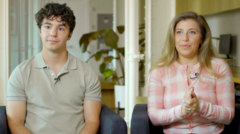A significant coalition of British artists and writers, led by figures like Elton John and Dua Lipa, has sent a letter to Prime Minister Keir Starmer advocating for urgent changes to copyright laws due to concerns about artificial intelligence leveraging their creative works without due compensation. The group insists that without these protections, the UK risks losing its status as a creative leader, while other voices raise caution about potential negative impacts on innovation.
Artists Urge UK Government to Reinforce Copyright Laws Against AI Exploitation

Artists Urge UK Government to Reinforce Copyright Laws Against AI Exploitation
Over 400 musicians and artists, including Elton John and Dua Lipa, are lobbying the UK government for stronger copyright protections to safeguard their works from artificial intelligence misuse.
Elton John, Dua Lipa, Sir Ian McKellen, and Florence Welch are among the high-profile artists advocating for updated copyright laws to protect their work from the encroachments of artificial intelligence. In a letter signed by over 400 British musicians, writers, and artists, addressed to Labour leader Sir Keir Starmer, the group expressed that not providing adequate protections would mean surrendering their creations to technology firms.
In their communication, the artists assert that the failure to revise existing copyright regulations jeopardizes not only their individual rights but also the UK's global status as a hub of creativity. They urge the Prime Minister to support an amendment to the Data (Use and Access) Bill, mandating that developers maintain transparency with copyright holders regarding the use of their material for training AI models.
A government spokesperson acknowledged the importance of fostering both the creative industries and AI sectors, stating, "We want our creative industries and AI companies to flourish" and underlining that no changes would be implemented without ensuring they benefit creators.
Other notable signatories include Nobel Prize-winning author Kazuo Ishiguro, playwright David Hare, and pop icons like Kate Bush and Robbie Williams. Sir Paul McCartney has also emphasized his worries about AI's potential to exploit artistic creativity without appropriate safeguards in place.
The artists contend that their contributions are essential to national storytelling and cultural innovation, asserting, "AI needs us as much as it needs energy and computer skills." They are specifically calling for support for Baroness Beeban Kidron's amendment ahead of a crucial House of Lords vote, which seeks to establish licensing frameworks for both AI creators and traditional artists.
While the artists have rallied for these changes, not everyone is supportive of their approach. Julia Willemyns from the Centre for British Progress think tank argues that such proposals may hinder the UK’s growth and would not protect against foreign firms using British content. She warns that a restrictive copyright framework could stifle domestic innovation and drive AI development away from the UK.
Amid increasing trepidation regarding AI's incorporation of copyrighted materials in its generative processes, artists have become more vocal in their opposition. Earlier in the year, musicians including Annie Lennox and Damon Albarn protested via the release of a silent album, highlighting their discontent with proposed changes to copyright laws.
Currently, the government has been consulting on allowing developers to utilize online creators' content unless rights holders choose to opt out. This proposal has faced backlash, prompting the government to rethink its approach.
Mr. Ishiguro stressed the fairness of not altering copyright laws merely to benefit large corporations at the cost of individual creators. He noted that while some minor concessions have emerged, it remains uncertain how substantial the government's reassessment will be.
The advocacy by artists is echoed by Baroness Kidron, who insists that transparency for tech companies under her proposed amendment is crucial for developing functional licensing regimes. She believes this move could position the UK competitively within the international AI supply chain, contingent on the establishment of a healthy licensing market.
In conclusion, while the government is working through the varied responses from its consultations, it emphasized the necessity to lay essential groundwork moving forward. It plans to publish a report assessing the economic impact and various viewpoints surrounding the copyright debate.
In light of the rapid evolution of AI technology and its implications for creative rights, the ongoing discussion highlights the pressing need for a balanced approach that protects artistic integrity while fostering technological innovation.




















